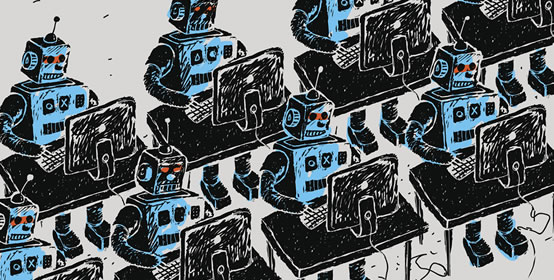
Technological singularity describes the point in time when artificial intelligence will become exponentially smarter than human intelligence. In the past, such concepts have mainly been restricted to sci-fi movies or fiction books. Modern-day scientists, however, have made such incredible advancements in the AI field that economists, academic experts and techies all argue that AI will soon start taking over human-tasks for many businesses. The projected job take-over is expected to impact industries across the board, and most are already preparing for the inevitable.
In 2013, Oxford researchers estimated that around 47 percent of jobs in the United States could potentially be automated by AI and replace human workers. Experts have identified certain jobs that are already performed more efficiently by AI including insurance claim adjusters, sports referees and real estate brokers. These types of jobs are only the tip of the iceberg according to most experts. Kai-Fu Lee, the founder of Sinovation Ventures and former head of Google China, believes that robots will likely replace over half of the current jobs over the next decade.
Robots can replace humans that work as oil-rig hands, warehouse employees, drivers, salespeople and fast-food workers. You may have already noticed that most customer service lines are initially handled by robots. Sorting, data entry, preparing taxes, underwriting and translation are all becoming tasks that can be automated. Incredibly, economists are estimating that as much as 40 percent of the Fortune 500 companies could be completely overtaken by newer automated algorithms.
AI’s sweeping paradigm-shift is likely to impact all industries including health care, transportation, banking, the military and many more. Advancements in areas of machine learning have created cars capable of driving themselves. While the technology is still in its initial stages, Otto Motors explains it has the “ultimate goal of making human driving obsolete”.
Combining self-driving cars with innovate companies like Uber is likely to spawn an entirely new transportation system. This future model will likely make private car-ownership nearly obsolete while reducing injuries and fatalities from car accidents. Machine learning is also beginning to outperform human doctors in identifying and diagnosing illnesses.
Astonishingly, a World Economic Forum report predicts that robot AI will result in a loss of over five million jobs over 15 developed nations by 2020. The dramatic change from human laborers to a robotic workforce has political analysists concerned about the future of capitalism. While speaking at a World Government Summit in Dubai, famous techie Elon Musk explained that merging with AI is the best way to prevent it from becoming a threat to public security. He explains that the AI revolution will be so quick and sweeping that the various industries as we know it cannot fully prepare for it. He argues that governments around the world will be forced into offering a universal basic income for those out of work. Musk explains, “I don’t think we’re going to have a choice”.
Mathew Burrows has proposed another potential solution of future affirmative action for human. He has advocated in favor of a tax on robots initially proposed by Bill Gates, and argues that factories should be required to employee a certain number of humans. It may be shocking to many that artificially intelligent robots may soon be taking their jobs, but even greater plights are being taken in the scientific realm. Experts from SpaceX and Tesla are already working to develop a neural lace that can connect the human brain to computers so that humans aren’t left behind after singularity.
Advancements have been so rapid that the world’s most advanced AI robot, Sophia, was recently granted citizenship in Saudi Arabia. While jobs may be lost, it’s important to consider the beneficial aspects that AI will bring to society. GDP is expected to grow rapidly, and sociologists think humans will be free to devote more time to more meaningful exploits.
While most experts are still debating over how society will handle the AI take-over, one thing is certain. AI will strongly influence industries across the board within the next few decades, and most industries are bracing for impact.